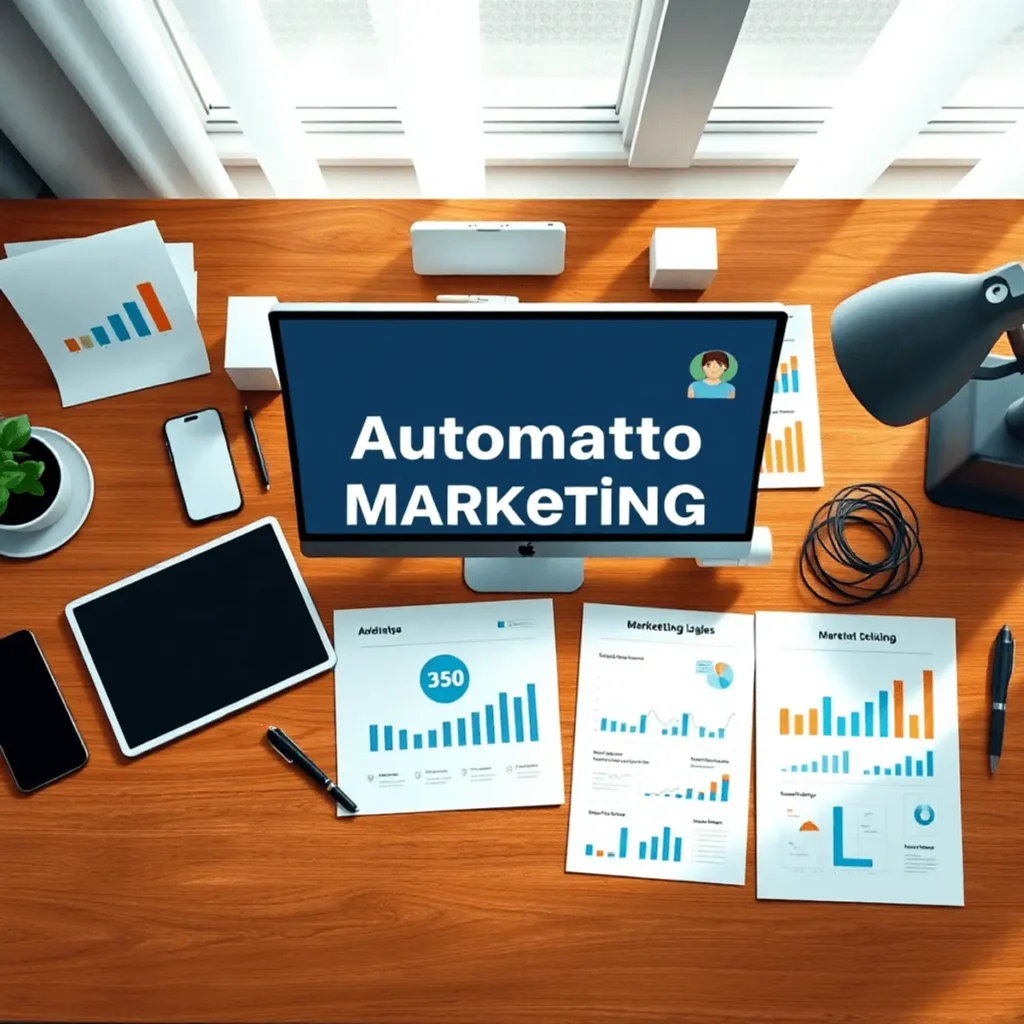Marketing automation in 2025 is characterized by AI-powered personalization, seamless integration across multiple channels, and a commitment to ethical data practices. Key trends include AI-driven decision-making, real-time data integration, advanced customer journey mapping, and predictive analytics. It is essential to consider ethical marketing, privacy concerns, and smart content adaptation. When selecting the right tools, it is important to evaluate. Their AI capabilities, privacy measures, and predictive insights optimize campaigns and enhance decision-making.

The Future of Marketing Automation: Trends and Tools for 2025
Marketing automation is changing the way businesses connect with their customers in 2025. With the help of AI-powered tools, companies can now deliver personalized content on a large scale, turning traditional marketing methods into sophisticated strategies driven by data.
Key Developments Shaping Marketing Automation:
1. AI-Enhanced Personalization
- Real-time content adaptation based on user behavior
- Predictive analytics for customer journey mapping
- Smart segmentation using machine learning
2. Seamless Omnichannel Integration
- Cross-platform customer experience optimization
- Unified messaging across digital touchpoints
Automated cross-channel campaign synchronization
3. Ethical Data Practices
- Enhanced transparency in data collection
- GDPR-compliant automation workflows
- Privacy-first marketing approaches
“Marketing automation has evolved from a luxury to a necessity, with 76% of companies generating ROI within their first year of implementation” – Marketing Automation Insights 2025
The combination of AI technology and ethical marketing practices makes automation a key element in successful digital marketing strategies.
Understanding Marketing Automation
Marketing automation transforms manual marketing tasks into streamlined, automated processes through specialized software platforms. This technology enables businesses to execute, manage, and measure marketing campaigns with precision and efficiency.
Core Components of Marketing Automation:
- Lead Generation & Nurturing: Captures potential customer information, tracks user interactions across platforms, and delivers targeted content based on behavior.
- Campaign Management: Schedules and coordinates marketing activities, manages multi-channel communications, and automates repetitive tasks.
- Analytics & Reporting: Measures campaign performance, tracks ROI and key metrics, and provides actionable insights.
Key Functionalities:
“Marketing automation software acts as a central command center for your marketing operations, handling everything from email campaigns to social media scheduling.”
- Automated email sequences
- Social media post scheduling
- Customer segmentation
- A/B testing capabilities
- Lead scoring systems
- Website visitor tracking
Operational Benefits:
- Time Efficiency: Reduces manual tasks by up to 80%
- Cost Reduction: Decreases marketing overhead expenses
- Scalability: Handles growing customer bases without additional resources
- Consistency: Maintains brand messaging across channels
- Data-Driven Decisions: Provides real-time insights for strategy adjustment
Marketing automation enhances customer experience through personalized interactions, timely responses, and relevant content delivery. The software’s ability to process vast amounts of data enables businesses to create targeted campaigns that resonate with specific audience segments, leading to improved engagement rates and higher conversion potential.
Key Trends Shaping the Future of Marketing Automation
Marketing automation in 2025 embraces revolutionary changes driven by technological advancements and evolving consumer expectations. These emerging trends reshape how businesses connect with their audiences and optimize their marketing efforts.

1. AI-Powered Decision Making
- Predictive analytics engines identify optimal sending times for communications
- Smart content generation tools create personalized messaging at scale
- Automated A/B testing systems continuously optimize campaign performance
2. Real-Time Data Integration
- Live customer behavior tracking enables instant response triggers
- Cross-channel data synchronization for unified customer profiles
- Dynamic pricing adjustments based on market demand and competitor analysis
3. Advanced Customer Journey Mapping
- Multi-touch attribution modeling across digital and physical touchpoints
- Behavioral pattern recognition for precise audience segmentation
- Automated customer journey optimization based on engagement metrics
4. Hyper-Personalization Capabilities
“73% of consumers expect companies to understand their unique needs and expectations” – Salesforce Research
- Location-based content delivery systems
- Weather-triggered promotional campaigns
- Device-specific experience optimization
- Time-sensitive offer management
5. Smart Content Adaptation
- Dynamic website content based on visitor profiles
- Automated email content customization
- Social media post optimization for different platforms
- Product recommendations that evolve with user preferences
6. Interactive Engagement Tools
- Chatbots with natural language processing
- Voice-activated marketing responses
- Augmented reality product demonstrations
- Virtual shopping assistants
7. Compliance and Privacy Integration
- Automated consent management
- Privacy-first data collection methods
- Transparent data usage tracking
- Regional regulation adherence monitoring
These innovations open up new opportunities for marketers, enabling them to deliver highly relevant and personalized experiences. The integration of these technologies enables businesses to respond to market changes and consumer needs with unprecedented speed and precision.
3. Navigating Data Privacy Considerations in an Automated World
Data privacy regulations have reshaped marketing automation practices, with GDPR setting global standards for ethical data handling.
Key Privacy Requirements for Marketing Automation:
- Explicit consent management for data collection
- Clear documentation of data processing activities
- Right to data erasure (“right to be forgotten”)
- Data minimization principles
- Privacy impact assessments
Marketing teams can build consumer trust through:
“Privacy isn’t just about compliance – it’s about building lasting relationships with customers who value transparency and respect.” – Data Privacy Alliance
Practical Implementation Steps:

Privacy-First Data Collection
- Use progressive profiling
- Implement granular consent options
- Regular data audits
Transparent Communication
- Clear privacy policies
- Regular updates on data usage
- Easy opt-out processes
Technical Safeguards:
- End-to-end encryption
- Data anonymization
- Regular security assessments
- Access controls
- Audit trails
Trust-Building Automation Practices:
- Preference centers for personalization control
- Self-service privacy dashboards
- Automated privacy rights management
- Real-time consent tracking
- Privacy-respecting analytics
Effective marketing automation today demands a balance between personalization and privacy.
4. Using Artificial Intelligence to Enhance Your Marketing Automation Strategy
AI technology transforms marketing automation into a powerful engine for personalized customer engagement and data-driven decision making. Here’s how AI amplifies marketing automation capabilities:
Real-Time Personalization at Scale
- Dynamic content adjustment based on user behavior patterns
- Automated A/B testing for optimal message delivery
- Smart segmentation using behavioral and demographic data
- Instant adaptation of marketing messages across channels
Campaign Optimization Through AI Algorithms
- Automated bid management for advertising campaigns
- Content performance prediction
- Send-time optimization for maximum engagement
- Smart audience targeting based on lookalike modeling
AI-Powered Data Analysis
- Pattern recognition in customer journey mapping
- Sentiment analysis of customer interactions
- Purchase probability scoring
- Churn risk identification and prevention
Actionable Insights Generation
- Customer lifetime value predictions
- Product recommendation engines
- Cross-selling opportunity identification
- Campaign ROI forecasting
The integration of AI with marketing automation platforms enables marketers to process vast amounts of customer data at unprecedented speeds. Machine learning algorithms continuously learn from customer interactions, refining targeting strategies and improving campaign effectiveness.
Real-World Applications:
“Our AI-powered automation system increased email open rates by 45% through smart send-time optimization” – Marketing Director, Tech Company
Smart chatbots answer customer questions all day, learning to give better replies.
5. Predictive Analytics: Anticipating Customer Behavior for Smarter Decision Making
This powerful tool gives a strong advantage in today’s data-driven market.
Key Applications of Predictive Analytics:
1. Customer Lifetime Value Prediction
- Identify high-value customers early in their journey
- Allocate resources to retain and nurture profitable relationships
- Customize engagement strategies based on predicted value
2. Churn Prevention
- Detect early warning signs of customer dissatisfaction
- Implement targeted retention campaigns
- Reduce customer acquisition costs through improved retention
3. Purchase Pattern Analysis
- Map seasonal buying behaviors
- Identify cross-selling opportunities
- Optimize inventory management
Budget Optimization Through Predictive Insights:
1. Channel Performance Forecasting
- Allocate marketing spend based on predicted ROI
- Identify optimal timing for campaign launches
- Adjust strategies based on channel effectiveness
2. Audience Segmentation Enhancement
- Create micro-segments based on behavioral patterns
- Develop targeted messaging for specific customer groups
- Improve campaign relevance through predictive modeling
Real-World Applications:
“Our predictive analytics implementation increased campaign ROI by 47% through improved targeting and timing optimization” – Marketing Director, Fortune 500 Retail Company
The integration of predictive analytics with marketing automation platforms enables sophisticated targeting capabilities:
- Real-time scoring of leads based on likelihood to convert
- Dynamic content adjustment based on predicted interests
- Automated campaign optimization using performance forecasts
- Personalized product recommendations driven by purchase pattern analysis
6. Embracing Responsible Marketing Practices in an Automated Era
Honest marketing builds long-term value for businesses and customers.
Key Elements of Ethical Marketing Automation:
- Transparent Data Collection Clear communication about data usage
- Opt-in preferences management
- Regular privacy policy updates
- Sustainable Communication Practices Reduced digital waste through targeted messaging
- Energy-efficient server solutions
- Carbon footprint monitoring of digital campaigns
Building Trust Through Ethical Automation:
“According to a study by Label Insight, 73% of consumers prioritize brand transparency over price”.
Practical Implementation Strategies:
- Green Marketing Initiatives
- Inclusive Marketing
- Value-Based Communication
- Digital-first approach reducing paper waste
- AI-powered content accessibility
- Educational content prioritization
Technology Integration for Responsible Marketing:
- AI-powered content moderation
- Automated diversity checks
- Environmental impact tracking
- Real-time ethical compliance monitoring
Brands excelling in responsible marketing automation report increased customer loyalty and enhanced brand perception ben & Jerry’s leverages automation to align social justice messaging with customer engagement.
By integrating responsible practices into marketing automation systems, businesses establish a foundation for sustainable growth and uphold ethical standards in an increasingly digital marketplace.
Choosing the Right Marketing Automation Tool for Your Business Needs
Selecting the perfect marketing automation tool requires careful evaluation of your business requirements and available options. Here’s a breakdown of top tools and essential selection criteria for 2025:
Key Selection Criteria:
- Integration capabilities with existing systems
- Scalability potential
- User-friendly interface
- Budget considerations
- Available customer support
- Analytics and reporting features
Top Marketing Automation Tools 2025:
- HubSpot: Best for all-in-one marketing solutions with comprehensive inbound marketing capabilities.
- Mark Engage: Best for B2B enterprises with advanced lead scoring.
- Pardot by Salesforce: Best for Salesforce users with deep CRM integration.
- Active Campaign: Best for small to medium businesses with email marketing automation.
- Mailchimp: Best for startups and small businesses with a user-friendly interface.
- Sales mate: Best for sales-focused teams with built-in CRM functionality.
- Drip: Best for e-commerce businesses with customer behavior tracking.
- Hootsuite & Buffer: Best for social media management with multi-platform scheduling.
“The right tool aligns with your business goals, team capabilities, and growth trajectory. Start with a free trial to ensure the platform meets your specific needs.” – Marketing Automation Expert
FAQs (Frequently Asked Questions)
What is marketing automation and why is it significant in modern marketing strategies?
Marketing automation refers to the use of software to automate marketing tasks, allowing businesses to streamline their marketing efforts and improve operational efficiency. It is significant in modern marketing strategies as it enhances customer experiences, allows for personalized content delivery, and enables brands to engage with consumers at scale.
How will AI impact marketing automation by 2025?
By 2025, AI-driven marketing automation tools will enhance personalization capabilities, enabling brands to deliver tailored content based on individual consumer behavior, al will help with predictive analytics, giving better insights into what customers like and might buy next, making targeting strategies better.
What are the key trends shaping the future of marketing automation?
Key trends include next-level personalization through real-time data utilization, the integration of omnichannel marketing strategies for seamless customer experiences, a focus on data privacy regulations like GDPR, and the adoption of ethical data handling practices in automated marketing.
What considerations should businesses keep in mind regarding data privacy in marketing automation?
As privacy laws change, businesses must stay updated and make sure they follow rules like GDPR. This helps build trust and avoid legal issues.
How can companies choose the right marketing automation tool for their needs?
Companies should focus on tools that offer essential features like email automation, customer segmentation, campaign analytics, and personalized messaging. These features help streamline marketing efforts and improve customer engagement.
What role does predictive analytics play in enhancing marketing automation
Predictive analytics plays a crucial role by utilizing historical data patterns to forecast future customer behaviors. This enables marketers to target specific audience segments effectively and optimize budget allocation across channels, ultimately leading to smarter decision-making in campaign strategies.
Powered by https://sharmadigitalpro.in/